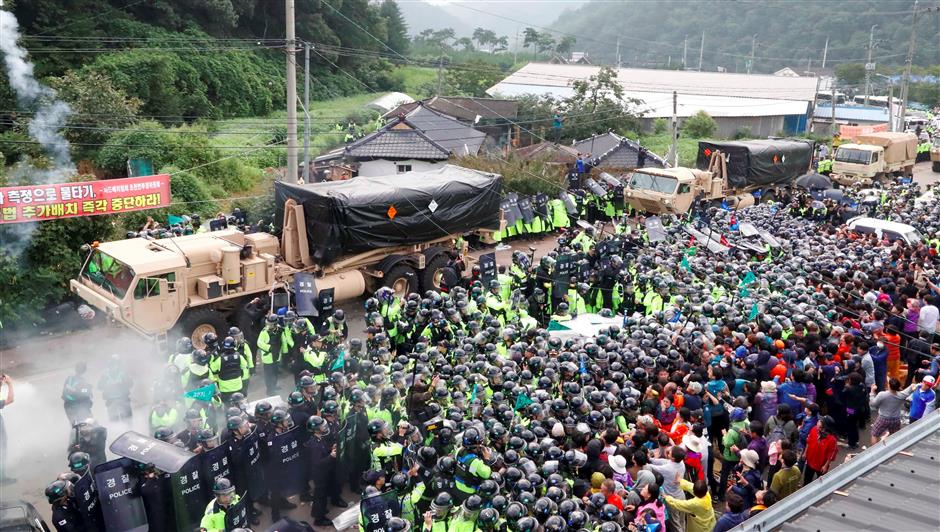China agrees more UN action on NK

Riot police block South Korean residents and protesters as US Terminal High Altitude Area Defense (THAAD) system equipment arrives at a former golf course in the southern county of Seongju. Four more launchers for the THAAD system were installed yesterday. China opposes the deployment.
China yesterday agreed that the United Nations should take more action against North Korea after its latest nuclear test, while also pushing for dialogue to help resolve the stand-off.
North Korea, which is pursuing its nuclear and missile programs in defiance of international condemnation, said it would respond to any new UN sanctions and US pressure with “powerful counter measures,” accusing the United States of aiming for war.
The US wants the UN Security Council to impose an oil embargo on North Korea, ban its exports of textiles and the hiring of North Korean laborers abroad, and to subject leader Kim Jong Un to an asset freeze and travel ban, according to a draft resolution.
Pressure from Washington has grown since North Korea’s sixth and largest nuclear test on Sunday. That test, along with a series of missile launches, showed it was close to achieving its goal of developing a nuclear weapon that could reach the US.
“Given the new developments on the Korean Peninsula, China agrees that the UN Security Council should make a further response and take necessary measures,” Chinese Foreign Minister Wang Yi told reporters.
“Any new actions taken by the international community against the DPRK should serve the purpose of curbing the DPRK’s nuclear and missile programs, while at the same time be conducive to restarting dialogue and consultation,” he said, referring to North Korea by the initials of its official name, the Democratic People’s Republic of Korea.
He said sanctions and pressure should spur dialogue and negotiation between the sides toward the goal of a peaceful solution on the Korean Peninsula.
“We believe that sanctions and pressure are only half of the key to resolving the nuclear issue. The other half is dialogue and negotiation. Only when the two are put together can it unlock the nuclear issue of the Korean Peninsula,” Wang said.
North Korea was typically defiant yesterday.
“We will respond to the barbaric plotting around sanctions and pressure by the United States with powerful counter measures of our own,” North Korea said in a statement by its delegation to an economic forum in Vladivostok in Russia’s Far East.
US Treasury Secretary Steve Mnuchin said he had an executive order ready for President Donald Trump to sign that would impose sanctions on any country that trades with North Korea, if the UN did not put new sanctions on it.
Russian President Vladimir Putin said at the meeting he thought the North Korea crisis would not escalate into nuclear war, predicting that common sense would prevail.
But he said he believed North Korea’s leadership feared that any freeze of its nuclear program would be followed by what amounted to “an invitation to the cemetery.”
Amid the rising tension, South Korea installed the four remaining launchers of a US anti-missile Terminal High Altitude Area Defense (THAAD) system on a former golf course south of the capital Seoul early yesterday.
Two launchers had already been deployed.
More than 30 people were hurt when about 8,000 police broke up a blockade near the site by about 300 villagers and members of civic groups opposed to the THAAD deployment, fire service officials said.
The deployment has drawn strong objections from China, which believes the system’s radar could be used to look deeply into its territory and will upset the regional security balance.
China said yesterday that it had lodged a diplomatic protest with South Korea following its announcement that it would increase deployments of the THAAD system.
“We urge the Republic of Korea (South Korea) and the United States to take seriously the security concerns and interests of China and regional countries, halt deployment progress and withdraw all the relevant equipment,” foreign ministry spokesman Geng Shuang told a regular press briefing in Beijing.
China has “lodged stern representations with the Republic of Korea,” he added.















